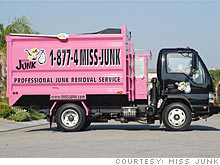The junk boom: Profiting from foreclosures
Junk hauling and scavenging are growth businesses these days.

(CNNMoney.com) -- The California suburbs around Los Angeles are filled with foreclosed houses - and in each one, entrepreneur Ramon Mercado sees opportunity.
Mercado is the owner of Miss Junk, a 20-person trash-hauling company. Launched late last year, Miss Junk began as a general junk-removal service, but it quickly settled into a niche assisting banks and realtors with foreclosure cleanups.
"We've seen our company grow exponentially because of this demand," Mercado says. A former real estate broker, Mercado is generating monthly revenue of around $150,000 right now from Miss Junk, ten times the company's initial monthly sales. "Foreclosures are the biggest, most profitable jobs we do."
"There has been a definite increase in activity in this area," says Cary Eckert, president of Realty World, a real-estate brokerage in Granada Hills, Calif., who has contracted Miss Junk for a number of jobs. This month is Realty World's busiest yet; with only nine employees, Eckert is currently juggling six foreclosure assignments.
Dustin Owens OMAC Hauling, which serves southwestern Ohio, has also seen a business boom. "We have seen a flood of foreclosures in the last two years, and are not seeing an end in sight," says Owens, who started his company in 1992. He estimates that 80% of his current assignments are foreclosure cleanups - and it's paying off. His revenue is up 12% from last year's $1 million.
Picking through the rubble of abandoned homes is daunting both physically and psychologically.
"Sometimes it feels disrespectful going in and getting rid of people's personal things. Some of my guys have a real hard time with it, but someone has to do it, and we are learning how to handle it," says Miss Junk's Mercado. His crews often arrive to find tableaus of interrupted living: meals still on tables, shoes and socks scattered around.
"It's like they were just there, and now they're gone," he says.
Owens of OMAC Hauling agrees. "The thing that amazes me most is that more often than not, the people seem to leave with only the shirts on their backs," he says. "They leave their baby and family pictures, their furniture, appliances, the baby's toys, even their vehicles - everything."
Part of real-estate broker Eckert's job is assessing the value of items left behind. If the items are collectively worth more than $300, owners are given a few days or weeks to return and collect them, but they never do, in Eckert's experience.
"People either take everything or leave everything," he says. "If they left them there in the first place, they won't be back to claim them later."
The cleanup specialists have turned up some treasures in their excavations. Eckert recently found a 20-foot-long, 8-foot tall shrine to the Dalai Lama in one house, while Owens' discoveries include an Italian painting from 1860 appraised at $11,000, old coin collections, a set of Colt revolvers from 1929, stamp collections, more than 1,000 Hot Wheels cars, and 200 Pez dispensers. He's even found diamond wedding rings: "I think homeowners go through a divorce along with the foreclosure and toss the rings."
Miss Junk and OMAC Hauling donate any valuable items they find to charity, but other junk companies have turned scavenging into a supplemental revenue stream. Zzazz Industries, a family-run junk removal business based in Fontana, Calif., holds garage sales to sell leftover items found in foreclosed homes, and recycles any metal and plastic items left behind.
"People leave the stuff they can do without, so just by recycling old lamps or chairs we find, we can bring in around $1,200 per year from this alone - and anything helps," says Frank Gallardo, who started Zzazz Industries in October 2007.
Ironically, Gallardo was himself evicted from his home: Right around the time he started Zzazz, he was booted from a rental home the landlord hadn't told him was in foreclosure.
"I can relate to what people are going through," he says. ![]()
-
The Cheesecake Factory created smaller portions to survive the downturn. Play
-
A breeder of award-winning marijuana seeds is following the money and heading to the U.S. More
-
Most small businesses die within five years, but Amish businesses have a survival rate north of 90%. More
-
The 10 most popular franchise brands over the past decade -- and their failure rates. More
-
These firms are the last left in America making iconic products now in their twilight. More













